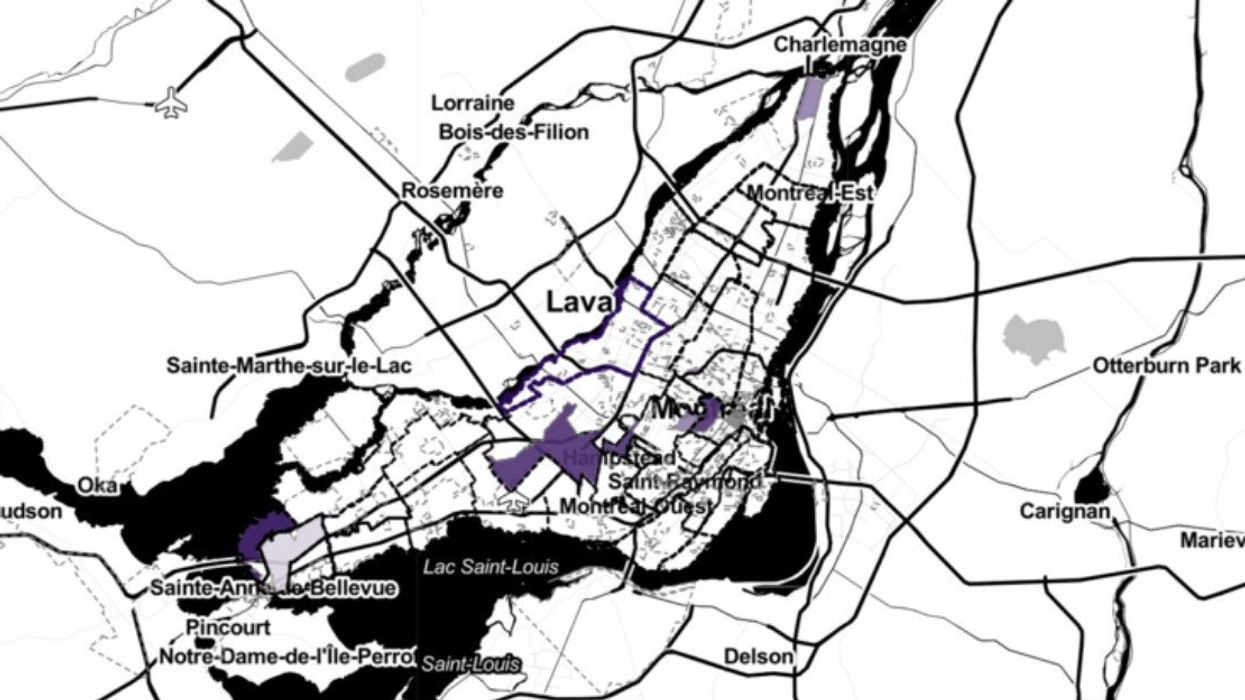A New Interactive Map Shows Who Montreal Police Stop Most & Where It Happens
Data reveals two demographics are targeted most.

A map of Montreal showing where police stops occur.
A new participatory mapping project reveals that one in three Montrealers believe their appearance or identity has contributed to being stopped by the police.
STOPMTL compiled data from the public to determine who the police stop the most and where. The project, launched in 2021 by a team from the Institut national de la recherche scientifique (INRS), McGill University, Concordia University and University College London, documents the "social and spatial patterns" of local police interventions since only 5 to 20% of stops are recorded by the Service de police de la Ville de Montréal (SPVM).
The research team found that young people and Black people are overrepresented, while white people are underrepresented among those stopped. Nearly one in five of those who reported being stopped identified as gay, lesbian, or bisexual.
While data submitted to STOPMTL is not formally validated, the findings are consistent with those from an independent research report commissioned by the SPVM in 2019.
"The results confirm concerns about social and racial profiling that have been repeatedly expressed by the public and suggested by the SPVM data," said STOPMTL project lead Carolyn Côté-Lussier, who is also a professor specializing in criminology and urban studies at INRS and a researcher at the International Centre for Comparative Criminology.
"It is the first time we have quantitative data suggesting that the people who are stopped perceive their stop as discriminatory," she said.
Around 74% of STOPMTL participants were men, 55% identified as white, and 17% identified as Black. Most identified as heterosexual (70%), while 18% identified as having an LGBTQ2+ sexual identity. While 41% of participants considered their stop justified, more considered it unjustified (43%).
The majority of police stops were reported in the boroughs of Côte-des-Neiges–Notre-Dame-de-Grâce and Ville-Marie, followed by Plateau-Mont-Royal, Sud-Ouest, Montréal-Nord, and Villeray—Saint-Michel—Parc-Extension.
The research team is calling for a new round of submissions from the public to collect more data and follow the evolution of people's perception of the SPVM's efforts to change its approach to conducting police stops.
Montrealers who have been stopped by the SPVM are being asked to share their experience on the STOPMTL.ca website.
If you or someone you know is struggling with harassment or discrimination related to gender identity or sexual orientation, please reach out to a trusted peer, parent or health care professional, or refer to these resources available in Montreal. If you need immediate assistance, please call 911 or go to your nearest hospital. Support is available.
If you or someone you know has been the victim of racism, or if you are interested in supporting organizations that are fighting racism in your community, refer to these resources available in Montreal.<
p>
- Quebec's Police Watchdog Investigated 5 Deaths Linked To Montreal Police Activity In 2022 ›
- Quebec Judge Says Flipping Someone Off Is A 'God-Given' Right For 'Every Red-Blooded Canadian' ›
- A Quebec Amber Alert Was Just Issued For An Abducted Infant - MTL Blog ›
- A 28-Year-Old Man Was Found Shot Dead In A Montreal Parking Lot - MTL Blog ›
- A Montreal Business Was Set On Fire For A Second Time In 2 Days - MTL Blog ›
